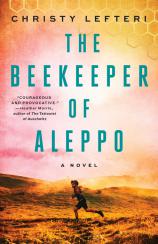The Beekeeper of Aleppo
Review
The Beekeeper of Aleppo
For years, the world has watched as stories of refugees arriving in foreign lands --- dead or alive --- are ridiculed, threatened and prematurely denied asylum and sent back to their war-torn homes. As gritty as the news can be, however, it is often too easy to distance oneself from the reality of the horrors of the refugee crisis. This is where fiction, particularly works like THE BEEKEEPER OF ALEPPO, comes in, to remind us of our capacity for love, empathy and hope.
From the very first page, Christy Lefteri’s book is gripping and poignant. It is told from the point of view of Nuri, a Syrian refugee and former beekeeper. Though he and his wife, Afra, have arrived in the United Kingdom, they have lost nearly everything in the journey --- including Afra’s sight. Blind and in pain, Afra relies on her husband for everything, even as they sit waiting for approval to see a doctor and be granted asylum. In chapters alternating between their life in a boarding house and their journey as refugees to get there, Lefteri presents readers with a powerful and unflinching look at the refugee crisis and reminds us that we cannot look away any longer.
Nuri is clearly a strong, determined man with plenty of good character, but as he chronicles his family’s journey from war-torn Syria through Turkey, Greece and finally the UK, he exposes a darker side, one that has suffered unimaginable and traumatic losses. Nuri and Afra were happy once, with Nuri working as a highly successful beekeeper with his cousin, Mustafa, and Afra painting and looking after their young son, Sami. Though Nuri and his cousin were peaceful men, the war soon came for them, taking Mustafa’s son from him and forcing him and his remaining family to flee. Like too many, Nuri and Afra waited too long and were forced to escape in the dark of night, leaving their home, Afra’s vision and the body of their only son behind. This loss reverberates through the book, not only in quiet moments of grief but in heated moments of resentment and tension between Nuri and Afra that follow them far past the deserts of Syria.
"Haunting, illuminating and exploding with awareness, THE BEEKEEPER OF ALEPPO represents the greatest gift of fiction: to inspire empathy in all readers."
From this point, Lefteri whisks readers through heart-pounding escapes through checkpoints, hazardous journeys in rubber boats, and, perhaps most terrifying of all, camps laden with traumatized --- and sometimes dangerous --- strangers. Lefteri never shies away from an honest description, from dead bodies to snipers and even rape, but she makes it clear that this is only one story, and the world is full of others that are possibly even more horrifying. Regardless of how closely you have followed the refugee crisis, I am sure that all readers will take something new away from this book --- I, for one, did not realize just how many stops and starts there are on the road to safety. Nuri and his wife bargain and haggle with numerous men, none of whom seem to care about the people they are helping, but rather what they can take from those who already have nothing. Throughout it all, Nuri and Afra (like so many before them) must struggle to remain hopeful, even as they can barely look at or touch one another, and are dealing with the psychological effects of post-traumatic stress disorder.
As Nuri recalls his journey to the boarding house where he and Afra await their asylum interview, he begins to befriend the other refugees staying with them --- from an elderly Moroccan man obsessed with British idioms, to Diomande, a Somalian refugee whose denial of the horrors he faced threatens to send him right back into the war zone. Lefteri delves deep into the idiosyncrasies and shortcomings of the systems meant to help these displaced people: in one particularly frustrating scene, Nuri, having waited months for the proper paperwork to see a doctor, is turned away because his social worker neglected to put his address on the form. Equally disturbing is the asylum interview process, in which Nuri is asked seemingly pointless questions punctuated by voyeuristic and cruel ones with little regard for how he will feel after replying --- or if there ever can be a right answer to a question like “Can you say something special about your deceased son?”
Perhaps most gripping of all is Nuri’s personal battle with his mind, which seems to have turned on him, tricking him into seeing things that aren’t there and speaking to ghosts. As he comes to terms with his situation, he begins to wonder if he has lost all hope and that is why he is struggling. Though readers will have met him only at the worst time of his life, they will come to love Nuri and root for him and Afra to rekindle their love and turn to one another for safety and redemption. Their love story is the heart of the book, and Lefteri writes it as deftly and gorgeously as she pens even the most devastating war scene.
Alternating between the two most traumatic timelines of Nuri’s life, Lefteri centers on the theme of blindness --- not only Afra’s, but Nuri’s own inability to see his emotional distress and, of course, the world’s willingness to turn a blind eye to everything people like Nuri and Afra have endured. The author is uniquely qualified to write this book, having worked as a UNICEF volunteer at a refugee center in Athens, Greece, and she herself is the daughter of Cypriot refugees. Still, she writes with the compassion and horror of a person who is seeing the crisis for the first time, and it adds a whole new level of urgency and terror to her beautifully written book. Even when she is describing the absolute worst sides of humanity, Lefteri writes lyrically and poetically, using every word to its fullest extent without wasting a moment of her readers' time.
Haunting, illuminating and exploding with awareness, THE BEEKEEPER OF ALEPPO represents the greatest gift of fiction: to inspire empathy in all readers.
Reviewed by Rebecca Munro on September 6, 2019
The Beekeeper of Aleppo
- Publication Date: June 23, 2020
- Genres: Fiction, Women's Fiction
- Paperback: 352 pages
- Publisher: Ballantine Books
- ISBN-10: 0593128176
- ISBN-13: 9780593128176




